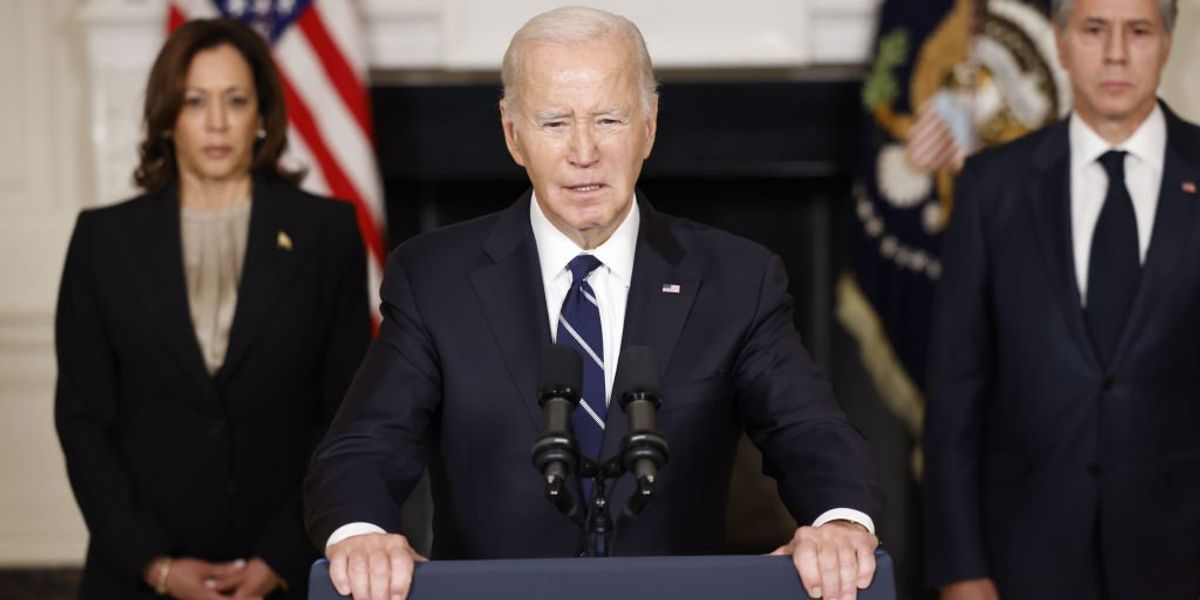Under the leadership of Secretary of State Antony Blinken, the U.S. State Department has become fixated on controlling speech under the pretense of guarding against so-called “disinformation.”
Fortunately, some of the apparent targets of the agency — reporters Gabe Kaminsky of the Washington Examiner and Matt Taibbi of the “Twitter Files,” as well as some Republican lawmakers — have chosen to fight back, calling out the State Department for trying to censor Americans and right-leaning media outlets exercising their First Amendment rights in ways the government doesn’t like.
Blaze News caught up with Kaminsky and others wrangled into this ongoing fight for free speech to learn what they have endured in the past and what they hope to accomplish going forward.
Background: The ‘disinformation’ boogeyman
These days, it seems that all high-profile Democrats and their allies in the media are obsessed with this trend.
In connection with FEMA funding and the hurricanes that recently battered the Southeastern United States, Vice President Kamala Harris claimed in early October that “there’s a lot of mis- and disinformation being pushed out there” by former President Donald Trump.
‘Our First Amendment stands as a major block.’
CNN anchor Dana Bash dutifully followed Harris’ lead and bragged in an X post that she had asked Harris “about dangerous misinformation coming in part from Donald Trump.”
Back in 2022, Harris’ running mate, vice presidential nominee Tim Walz (D), bizarrely asserted that “there’s no guarantee to free speech on misinformation or hate speech, especially around our democracy.”
Speaking at a World Economic Forum event in September, former Secretary of State John Kerry lamented that “if people go to only one source and the source they go to is sick and has an agenda and they’re putting out disinformation, our First Amendment stands as a major block to the ability to be able to just hammer it out of existence.”
Even with deadly forces of nature flooding a major swath of the U.S., tens of thousands of rapists and murderers from foreign countries stealing into the country, painfully high prices at the pump and in grocery stores, and the ever-present threat of nuclear war, the Democrats have apparently settled on “disinformation” as the most pressing problem facing America today.
The State Department never responded to the series of questions Blaze News submitted about the topic, so it remains unclear how the department defines “disinformation” or how it determines which information is branded “disinformation” and which is considered plain old information.
Despite this lack of clarity, back in 2016, under the Obama administration, the State Department created a subdivision entitled the General Engagement Center, which has as its mission “to recognize, understand, expose, and counter foreign state and non-state propaganda and disinformation efforts aimed at undermining or influencing the policies, security, or stability of the United States, its allies, and partner nations.”
In short, the GEC was mainly established to root out “disinformation” propagandized by other countries in order to guard Americans against pernicious foreign influence.
Within just a few years, however, the GEC appears to have devolved into little more than a federal panopticon seeking out Americans and American media outlets that hold disfavored views and then censoring them by allegedly funding disinformation-related organizations, both foreign and domestic.
The Twitter and Kaminsky files
In January 2023, independent journalist Matt Taibbi famously initiated what became known as the “Twitter Files,” a series of exposés revealing alleged ties between the social media platform now called X and various federal agencies.
The first installment of the Twitter Files focused mainly on 2020 — while Trump was still in office — and the increasing number of requests from federal agents and lawmakers to silence accounts over alleged disinformation about COVID-19. According to Taibbi’s report, the State Department’s General Engagement Center was among the first to flag supposedly “Russia-linked accounts” that promulgated COVID-related messages in various languages to spread disinformation to “a global audience.”
By 2021, Joe Biden had been sworn into office, and the GEC then allegedly expanded its efforts to root out disinformation.
To that end, the GEC apparently partnered with the Global Disinformation Index, a London-based organization that ranks various media outlets based on the risk they pose of purveying disinformation. Because GDI is located overseas, the GEC could theoretically send money its way without running afoul of the GEC mission to address only “foreign state and non-state propaganda and disinformation efforts.”
And since the GDI included many American outlets on its Dynamic Exclusion List, the GEC appears to have indirectly funded attacks on American media. Blaze Media was among the top 10 media outlets the GDI described as the “riskiest” for disseminating disinformation, as were the Daily Wire, the Federalist, RealClearPolitics, One America News, and the New York Post.
According to reports from Gabe Kaminsky of the Washington Examiner, between October 2021 and March 2022, the GEC gave the GDI a grant of $100,000.
The National Endowment for Democracy, a nonprofit heavily funded by the State Department, apparently gave the GDI an additional grant of more than $750,000, bringing the total given to the GDI by organizations within the State Department’s purview to over $850,000.
Neither of those grants has been renewed, the New York Post reported.
‘The State Department had numerous opportunities to respond to my reporting on it funding the Global Disinformation Index, but they declined to answer basic questions.’
Rather than engage in introspection after that information became public and assess whether the State Department had gone too far in seeking to silence free speech and the free press, in March 2023, the department apparently compiled a press guide so that agents could defend it against the reports from Taibbi, Kaminsky, and others.
The New York Post eventually got hold of the press guide and published screenshots of it in a damning report last month. All of the screenshots of the State Department’s press guide shared by the Post except one is marked “U.S. Department of State” and “not for public release.”
According to one screenshot, which appears to be a script for agents to follow in the event they are asked about the relationship between the GEC and the GDI, agents are encouraged to say that the GEC did not invest in the GDI “to blacklist conservative media outlets” but rather to analyze “disinformation efforts in East Asia and Europe.”
“The GEC presented GDI with a scope of work to apply its disinformation risk measurement across a set of foreign countries and languages in East Asia and Europe,” the script suggests that agents say, according to the screenshot. “GDI was able to expand its disinformation risk measurement across six new languages — Chinese, Japanese, Korean, Vietnamese, Russian and Ukrainian — enabling a more precise focus on [People’s Republic of China] and Russian disinformation activities.”
“The GEC’s work with GDI was limited to counter-disinformation efforts in East Asia and Europe,” another screenshot reiterates.
Should a State Department agent be asked whether the GDI ever created “a blacklist of American sites,” the script suggests referring the inquirer “to GDI for questions on their activities.”
Other screenshots of the press guide indicate that the State Department wanted to go on the offense, seemingly attacking the reporters who covered the relationship between the GEC and the GDI rather than defend the actions of the agency.
In a section entitled “Background for Briefer’s Eyes Only,” the press guide accuses Taibbi of misrepresenting the facts regarding federal influence over Twitter and Elon Musk of amplifying Taibbi’s misrepresentations by retweeting his first Twitter Files thread.
“Elon Musk’s retweet of Taibbi’s thread insinuates that the [United States government], and the GEC in particular, pressured Twitter to close U.S. accounts of which the USG disapproved,” one screenshot says. “The evidence offered for this claim is often missing, inferred, or presented out of context.”
The text in the screenshot never explains in what way Taibbi failed to support his claims or offered evidence “out of context.”
The State Department press guide also takes aim at Kaminsky, implying that he failed in his journalistic responsibilities by not asking for an interview with State Department officials, even as it admits that Kaminsky “sent questions repeatedly” to the State Department press office, the screenshot shows. The guide even acknowledges that the press office “responded to his requests.”
Kaminsky, who reportedly sent the State Department press office nearly a dozen requests for comment between January and February 2023, gave the Post a different version of events. “The State Department had numerous opportunities to respond to my reporting on it funding the Global Disinformation Index, but they declined to answer basic questions,” he said.
In a summary page of the press guide, the State Department reiterates the mission of the GEC, that it is geared toward combatting “foreign attempts to spread disinformation and propaganda globally” and that it “does not fund programs in the United States.”
Another page of the guide insists that “the GEC does not and has never attempted to moderate content on social media,” a screenshot reveals.
In a statement to Blaze News, Kaminsky called that assertion “false.”
“That claim is untrue alone based on the GEC’s involvement in the lead-up to the 2020 election with the Election Integrity Partnership, a collaboration between colleges, think tanks, social media platforms, and the U.S. government to thwart alleged falsehoods online,” he said.
“It makes sense that the State Department — or any other agency — would craft public or non-public press guidance to determine how to respond to reporting that scrutinizes its activities and unearths wrongdoing,” he continued.
“Investigative reporting by Taibbi, myself, and other journalists demonstrated that the GEC has been closely linked to efforts by activists to suppress domestic content on social media and also funded entities such as the Global Disinformation Index that aim to thwart U.S.-based voices that the British group disagrees with.”
Matthew Peterson, editor in chief of Blaze News, one of the outlets disparaged by the GDI, is likewise incensed that the federal government has seemingly taken aim at its own law-abiding citizens:
The federal government now routinely uses our tax dollars to shape and censor political speech in America. In this case, we see the State Department engaged in an active war against journalists like Matt Taibbi and Gabe Kaminsky and elected officials like Jim Banks who dared to expose their unconstitutional activity. If America is to retain a republican form of government, federal officials cannot be allowed to attack and smear anyone who attempts to discover the truth about what they are up to.
The State Department, the Global Disinformation Index, the National Endowment for Democracy, and Taibbi did not respond to a request for comment.
‘A sloppy and hypocritical lie’: Lawmakers become involved
In addition to Taibbi and Kaminsky, the State Department press guidance obtained by the Post also refers to members of Congress, including Sen. Chris Murphy (D-Conn.) and Rep. Jim Banks (R-Ind.).
Murphy, who has described himself as “one of the bipartisan creators” of the Global Engagement Center, appears to have been included in the press guidance because he issued his own tweet thread in February 2023, claiming that the accusations against the GEC in Taibbi’s Twitter Files thread were “MADE UP OUT OF THIN AIR.”
According to Murphy, the GEC never “improperly labeled” Twitter accounts as agents of “Russian propaganda.”
“All the GEC did was was to note that bots and social media accounts that had previously been proven to be linked to foreign governments were now in the business of spreading anti-U.S. COVID misinformation. That’s it,” he wrote.
‘The Putin regime and the Biden-Harris administration both hate free speech, and that’s why they targeted me.’
The reasons for including Rep. Banks in the State Department press guidance are less clear, especially since the key reference to him in the document appears to be a misquotation of a statement Banks gave to Kaminsky.
For an article published February 9, 2023, Banks told the Washington Examiner: “House Republicans will be hauling these bad actors before Congress, and I absolutely support legislation to ban federal funding of anti-free-speech groups.”
However, the quotation attributed to Banks that appears in the State Department press guidance, according to a screenshot shared by the Post, looks markedly different: “The Republicans of the House of Representatives will bring these bad actors to justice to Congress, and I absolutely support the legislation banning federal funding for the fight against freedom of speech.”
In a letter dated September 16, 2024, and addressed to Secretary of State Blinken, Banks indicated that the cause for the discrepancy is that the State Department cited “RIA FAN (Russia)” as the source for Banks’ statement, not Kaminsky or the Washington Examiner.
The ultimate effect of the GEC’s “intentional misquotation,” Banks argued in the letter, was to give “the impression that [he] had been speaking with a Russian propaganda outlet.”
“The State Department, in defense of its domestic so-called ‘disinformation’ operation, purposefully spread disinformation about a U.S. lawmaker,” the letter continued. “This is a sloppy and hypocritical lie and it is typical of the Biden-Harris State Department’s repeated attacks on the First Amendment and Americans’ free speech rights.”
Kaminsky is likewise troubled by the apparent misquotation of Banks, telling Blaze News that it raises “concerns about speech suppression.”
“The State Department’s decision to cite the Russian misquotation, which did not circulate among U.S.-based readers, was an apparent effort to unfairly link Banks to a foreign adversary. Some would call that disinformation. Ironic, no?”
In a statement to Blaze News, Rep. Banks called out Russia and the Biden-Harris administration as enemies of free speech.
“Russia sanctioned me for being an enemy of Vladimir Putin, and now the Biden State Department is falsely smearing me as a Russian propaganda booster,” he said. “The Putin regime and the Biden-Harris administration both hate free speech, and that’s why they targeted me.”
About a week after Banks issued the letter to Blinken, Rep. Darrell Issa (R-Calif.) wrote a letter of his own, claiming the GEC was beyond hope and demanding its outright dissolution.
“By smearing anyone who disagrees with it as a Russian stooge, this network conflates U.S. citizens with a U.S. adversary, as State Department talking points did to my colleague Representative Jim Banks and the award-winning journalists Gabe Kaminsky and Matt Taibbi in a scheming sleight of hand that ruled out of bounds political opinions and fact-based reporting it opposed but cannot refute,” Issa said.
“Mr. Secretary: It is time for this failed entity to be held accountable. It is time to bring an end to the Global Engagement Center,” his letter closed.
In a statement to Blaze News, Issa said:
The First Amendment rights of the American people are threatened not only by malign actors in the EU, U.K., or Brazil — but by our own State Department and specifically the Global Engagement Center. There truly is a Censorship Industrial Complex at home and abroad, and our opposition to it must be no less comprehensive. Congress can’t look away from this continuing scandal that grows worse with every revelation. We need to be committed and creative if we’re going to win the fight for free speech and a future without the GEC is a step in that right direction.
Issa may soon get his wish. A State Department appropriations bill that has already passed the House and that will soon be under consideration in the Senate seeks to strike funding for the GEC based on its alleged ties to American censorship.
Refusing to be silenced
Ever since Taibbi, Kaminsky, and others exposed the apparent attempts at the Global Engagement Center to censor Americans in defiance of the First Amendment, elected Republicans and some watchdog groups have taken action against it.
‘One of the most egregious government operations to censor the American press in the history of the nation.’
Back in December, Republican Texas Attorney General Ken Paxton joined the Daily Wire and the Federalist in filing a lawsuit against the State Department for allegedly “actively intervening in the news-media market to render disfavored press outlets unprofitable” by sending taxpayer dollars to help fund the Global Disinformation Index and a similar group called NewsGuard.
The lawsuit further alleged that the GEC implemented “one of the most egregious government operations to censor the American press in the history of the nation.”
In response to a request for comment, a spokesperson from NewsGuard told the Post that the lawsuit “inaccurately portrays” NewsGuard’s relationship with the State Department.
“NewsGuard does not offer any technology that censors or blocks any content, or that blocks ads on content,” the spokesperson continued. “Instead, we provide information — our assessments of sites — so that our clients can decide for themselves where to place their ads or which content to amplify, and each client decides for themselves how to use that data.”
Following the bombshell report from the New York Post that made public the State Department’s press guidance, a group identified as the Functional Government Initiative filed Freedom of Information Act requests in the hopes of uncovering further details about the agency’s alleged attempts to malign Kaminsky, Taibbi, Banks, and others in defense of the GEC.
In its requests, the Functional Government Initiative also asked for certain communications involving Blinken and other top State Department officials dating all the way back to January 2023. The aim, FGI spokesperson Pete McGinnis told the Examiner, was to see “who was involved in the blacklisting efforts” and “just how high up the chain this memo was guiding their media strategy.”
“The reporting on the Biden-Harris administration’s censorship clearly struck a nerve at the State Department.”
Like Blaze News? Bypass the censors, sign up for our newsletters, and get stories like this direct to your inbox. Sign up here!
Read the full article here





![Viral MAGA Hat Maniac Who Faceplanted During Attack Gets Identified [WATCH] Viral MAGA Hat Maniac Who Faceplanted During Attack Gets Identified [WATCH]](https://www.rvmnews.com/wp-content/uploads/2024/09/2024.09.22-11.01-rvmnews-66eff90194c68.jpg)


![Tesla Firebombings Aren’t an Outlier, It’s the Norm for the Democratic Party [WATCH] Tesla Firebombings Aren’t an Outlier, It’s the Norm for the Democratic Party [WATCH]](https://www.rvmnews.com/wp-content/uploads/2025/01/2025.01.29-01.46-rvmnews-679a314f106c0.jpg)

![Democrat Rep Regrets Being Caught on Tape About Lawfare Strategy to Take Down Trump [WATCH] Democrat Rep Regrets Being Caught on Tape About Lawfare Strategy to Take Down Trump [WATCH]](https://www.rvmnews.com/wp-content/uploads/2025/03/2025.03.06-10.39-rvmnews-67c97b4788839.jpg)